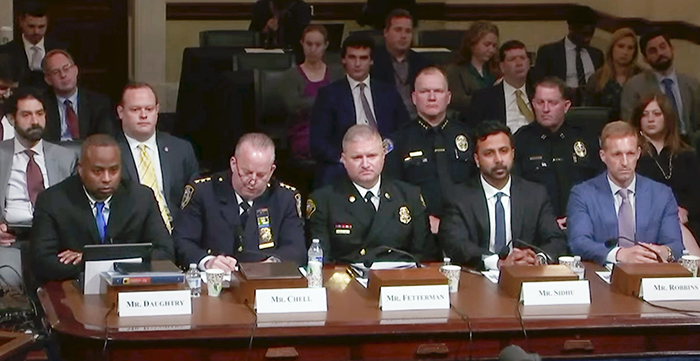Michael Robbins, President and CEO of the Association for Uncrewed Vehicle Systems International (AUVSI), testified before the U.S. House of Representatives on how first responders are using drones to aid in public safety missions and emergency response.
The joint hearing on “Unmanned Aerial Systems: An Examination of the Use of Drones in Emergency Response” was hosted by the Committee on Homeland Security, Subcommittee on Emergency Management and Technology and Subcommittee on Counterterrorism, Law Enforcement, and Intelligence.
“The use of our industry’s technology in public safety is unquestionably a very positive use case,” stated Robbins. “Drones are saving lives in emergency response operations. They are being relied on to reduce the risk posed to first responders, every day, in communities across the nation.”
Written testimony covered the need for Congress to enact grant programs to support public safety agencies’ transition to secure UAS, the need to bolster the domestic manufacturing supply chain, and Federal Aviation Administration (FAA) airspace access constraints.
Other hearing witnesses were Kaz Daughtry, Deputy Commissioner, Operations, New York City Police Department; John M. Chell, Chief of Patrol, Patrol Services Bureau, New York City Police Department; Kevin Fetterman, Division Chief, Command and Emergency Planning, Orange County Fire Authority, On behalf of the International Association of Fire Chiefs; and Rahul Sidhu, Founder and CEO, Aerodome.
During opening remarks, Emergency Management and Technology Subcommittee Chairman Anthony D’Esposito (R-NY) said, “The benefits of drone use in emergency response are far-reaching. As police departments look to expand their use of UAS technology, it is important that they take stock of any unintended national security concerns.”
“It is important that the federal government and intelligence community continue to share any guidance and relevant security information so that law enforcement agencies and first responders are able to take necessary precautions while not stifling innovative tools,” continued D’Esposito. “Further, it is important that the U.S. House of Representatives examine any regulatory barriers to public safety agencies when looking to utilize emerging technologies. We need to work with you to make sure you have the ability to keep your communities safe.”
Next month, AUVSI plans to convene its members for its annual Hill Day to discuss these issues and more. Members of its Defense, Air, Maritime, Ground, and Cyber Advocacy Committees will meet with lawmakers to discuss policies that will allow the deployment of uncrewed systems to better serve American communities, including for applications in public safety and emergency response.




